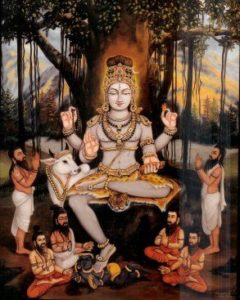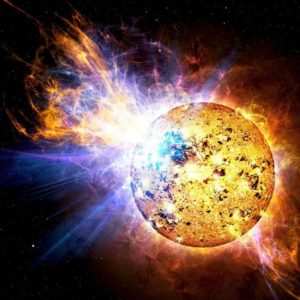असित-गिरि-समं स्यात् कज्जलं सिन्धु-पात्रे सुर-तरुवर-शाखा लेखनी पत्रमुर्वी।
लिखति यदि गृहीत्वा शारदा सर्वकालं तदपि तव गुणानामीश पारं न याति॥
O, great master! Even, if one were to assume that the blue mountain, the ocean, the heavenly tree, Parijata, and the earth are the ink, the ink-pot, the pen and the paper respectively and the goddess of learning (Saraswati) herself is the writer, she will not be able to reach the frontiers of your greatness, however long she were to write!
Shiva Mahima Stotra of Gandharva Pushpadanta.
The #Mahashivaratri celebrated on the Chaturdasi Tithi of Phalgun masa is almost universally regarded as great occasion for worship, meditation, aseticism and devotion to Lord Shiva. The significance of it is refered to in various Purana-s like the Skanda, Linga, Padma, Shiva etc. Some believe that this was the night when Shiva performed his cosmic dance of creation and dissolution known as the Tandava Nritya, while other traditions, particularly the Shakta-s believe this was the night when Shiva was married to Shakti.
Spiritually both these two background stories of Lord Shiva point to the same basic idea, that only when the Purusha tattwa joins with Shakti that creation (which is desireable) is enabled and that is what Shiva’s dance also embodies; cycles of constant creation and destruction like the endless flow of water in a river. Every moment things change only to create something new.
Iconography as well as related stories of each devata are also representative of and contain different shades of spiritual meaning related to the specific devata. Shiva’s blue-throat, Nilakantha, is evidence of His power to consume and transform just about anything including the most tamasic of substances like the poison of the whole world: Halahala. Consequently there is a tradition of offering things like Dhatura (which can be quite poisonous) to Lord Shiva. Shiva is always shown in a state of deep samadhi, a self-intoxication, only this is different from normal human condition of samadhi where the world gets negated, because in Shiva’s samadhi He is aware of Himself so deeply that he becomes aware of everything around in the Universe, because ultimately His own Shakti or consciousness has created the Universe. In recognition of this Divine intoxication there is the tradition of offering bhang or other intoxicants to Lord Shiva.

Shiva is shown wearing a scanty tiger or deer skin, sitting almost naked in the coldest peak of Kailasa. He is thus the lord of tapashya, of penance, for no being the Universe, deva or asura, can match his capacity for austerity. That too he can grant to a devotee if the later so desires and is able to draw Shiva’s grace towards himself or herself. It is interesting to note that in the Mahabharata probably the most worshiped of gods is Mahadeva. Even Krshna had done tapas for Shiva which resulted in his son Samba among other benedictions.
Shiva is always associated with liminal conditions, heterodox spaces particularly the charnel grounds. In Tantra he is shown to reside in the head inside the thousand-petalled lotus which is as *beyond* as it is possible for a human being or society to imagine. Of the One Supreme Reality, Shiva represents its purely transcendental persona, He who stands apart and watches, and has no favorites or takes no sides in anything or anywhere in creation. Humans are but one aspect of creation. His impartial transcendent power is experienced even among the non-human residents of the Universe like Gandharvas, Yakshas, Bhutas, Preta, Nagas etc Therefore anyone who can appease Shiva can get any boon from him, a fact that Asura-s have used various times to their immediate benefit as mentioned in the Puranas. In his eyes none of them are better or worst, special or inferior. This fact is further demonstrated when Shiva is shown surrounded by hordes of ganas, so weird and terrifying that the whole group can be classified as rejects from human society and consciousness. Auspcious and inauspicious has been transcended, good and bad have been brought to sameness, merit and demerit is not something he stands in judgement of, all in His eyes are but an expansion of His own Shakti. This also makes him, in human parlance, gullible, or bhola. Hence the name Bholenath. It is this superhuman, unthinkable detachment from creation that makes Him have such infinite Power over creation. If the world of creation is a hurricane, then Shiva is the eye of that Hurricane, the point of maximum stillness, where not a blade of grass will move. Which s why the earliest and best representation of Shiva is the structure of the Shiva Linga. Steady, unshakeable, undisturbed by anything around.
This also easily made him Parameshwara, the supreme Lord, in the Vedantic schools of non-duality. That which is beyond the mind (and therefore beyond creation), but resides deep inside the hridaya guha (a term used in Upanishats), the cavity of the heart, which when experienced obliterates the divsion between the Kshetra and the Kshetrajna, the field and the knower of the field of knowedge. Thus the knower, the known and the process of knowledge becomes one. This is the Absolute Himalaya of non-duality, Adwaita. And this is the state of Shiva where He becomes the Supreme Self – “I” beyond the eye.

We also get the story of Shiva’s destruction of Daksha’s Yagya. Daksha means one of who is an expert. The purport of this tale is that one who has attained a perfection of ritualism (like Daksha) but refuses to entertain the Divine (Shiva) in his mental schema believing falsely that by mere exceptional ritual performance he may attain to whatever goal he so desires is destined to be decimated and is nothing more than a animal known for its universal stupity in occult literature, the goat, whose head is planted on Daksha after Shiva decapitates him. This brings about the most vital idea that has become ingrained in the various Shaiva paths, that even simple acts of devotion, with or without sufficient scriptural knowledge can still invoke the compassion of the god of gods.
#Mahashivaratri is auspicious for all devotees of Shiva and Shakti. Infact by most accounts this is arguably the holiest night, where any kind of spiritual effort can be blessed by the grace of Shiva into fruition. From vedic to pasupatas, aghora, sabar, to tantric, almost every tradition places Shiva in pedestal of great reverence, for even an ounce of Shiva Tattwa inside an individual makes him/her capable of breezing over the difficult waters of existence blissfully safe, secure, and unharmed. The great God of gods, Mahadeva, may or may not change your destiny, but he can show you how to remain unaffected by things around, while enjoying the bliss of Self-intoxication. And THAT is a prize worth lifetimes of effort!
ॐ नमः शिवाय


